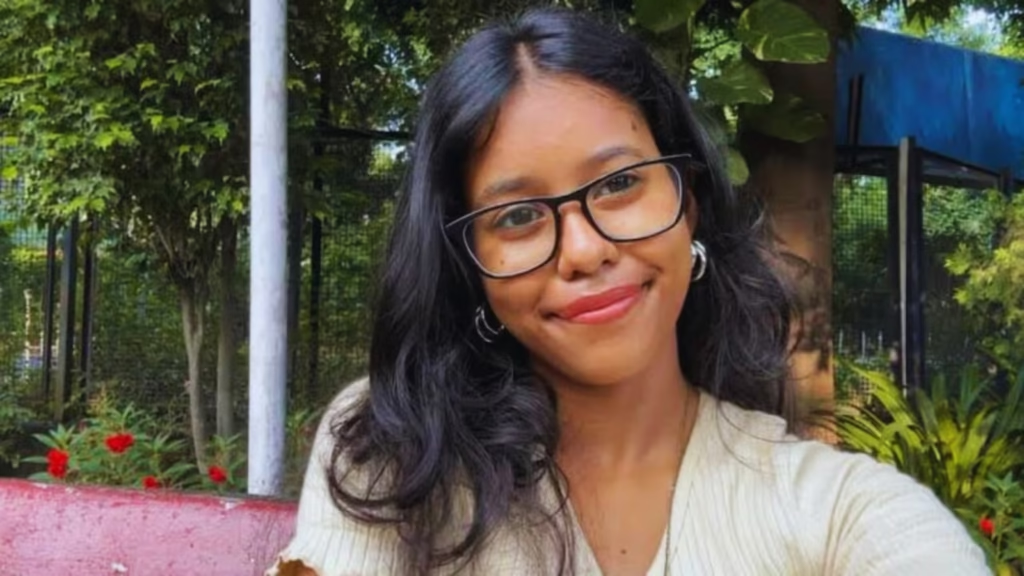A Young Life, High Hopes — And Sudden Silence
On July 7, 2025, 19‑year‑old Sneha Debnath—a Delhi University student originally from Sabroom, Tripura—left her home in south Delhi’s Paryavaran Complex. Her last known communication was at approximately 5:56 AM, when she informed her mother that she was going to Sarai Rohilla railway station with a companion.
By 8:45 AM, her phone was off. The friend denied meeting her. Tracking efforts revealed that Sneha Debnath had been dropped off by a cab near Signature Bridge, a location known for its tragic history.
After losing communication, her family became concerned and filed a missing person’s report. Delhi Police, along with the NDRF, launched an urgent search operation stretching from Nigam Bodh Ghat to Noida. Despite multiple witnesses who claimed they saw a young woman matching her description on the bridge, no CCTV footage was available—none of the more than 60 cameras in the area were working, except for a lone speed‑monitoring unit that only captured still images of moving vehicles.
A Note That Changed Everything
At Sneha Debnath’s residence, police discovered a handwritten note that many believe explains her final actions: she wrote that she felt like a “failure” and a “burden,” and intended to end her life by jumping from Signature Bridge on the morning of 7th July. She explicitly stated the decision was her own, with no outside influence—“… it was no one’s fault but mine …”
Tragic Discovery
Sneha Debnath‘s body was found in the Yamuna River beneath the Geeta Colony overpass, almost 10 kilometers downstream from the bridge, following six days of intense searching. Her family identified her, and the tragedy was confirmed as a suicide. A case had been registered under kidnapping and abduction sections, but the note and other evidence strongly suggest self‑harm.

Who Was Sneha Debnath?
Sneha Debnath was a second-year B.Sc. Mathematics student at Atma Ram Sanatan Dharma College, Delhi University. She was exceptionally bright—pursuing full-time mathematics, a data‑science certification from IIT Madras, and interning remotely with an Australian firm, all while being self‑reliant and financially independent.
Her family described her as an overachiever: academically gifted, deeply ambitious, and utterly determined not to rely on others financially—even though her father, a retired Subedar Major (Honorary Lieutenant) Pritish Debnath, was receiving dialysis and fighting chronic kidney failure.
Also Read: https://factnestmedia.com/saina-nehwal-announces-separation-from-parupalli/
The Missing Support
Attempts by her family to seek leads online included launching a public dashboard. Friends shared that Sneha had been expressing emotional distress in messages to friends in the months prior, indicating isolation and pain.
Critically, her sister raised concerns: why would a distressed student travel to a bridge with non‑functional cameras when there were safer options closer to home? The failure of surveillance at Signature Bridge struck sharply as a fatal systemic lapse.
Calls for Answers and Action
Sneha’s family and friends have condemned the failure of public safety infrastructure and law enforcement coordination. They pointed out the Signature Bridge falls under the jurisdiction of four to five different police stations—a factor they believe contributed to delayed response and lack of accountability.
Their demands include:
- All CCTV cameras in and around the bridge need to be repaired and audited very away.
- Clear jurisdiction designation to prevent confusion.
- Full transparency in the ongoing investigation.
- Better mental health support systems for students, especially those living away from home.
What This Tragedy Reveals
Sneha’s death is devastating, but it also exposes three urgent issues:
- Mental health of young adults: Her note, her emotional distress, and the absence of visible support point to a gap in accessible mental health care in student communities.
- Public safety infrastructure: Non‑functional surveillance in a high‑risk area hampered search efforts and might have cost precious time.
- Law enforcement coordination: Fragmented jurisdiction may lead to gaps in response and investigation—crucial in missing‑person cases.
In Loving Memory: A Promise to Act
Sneha Debnath was intelligent, driven, and full of dreams—an overachieving student balancing coursework, internship, and personal ambition. Yet behind her achievements lay silent suffering. Her tragic death stands as a call to reflect, act, and build stronger systems of support.
May her story prompt us all to take mental health seriously, demand proper safety infrastructure, and ensure collective responsibility so no young life feels compelled to silence.
Conclusion
Sneha Debnath’s death is a deeply painful tragedy. A young woman striving for excellence, managing responsibilities and dreams in a big city—yet her internal suffering went unseen. As her family grieves, they demand answers, reforms, and accountability.
Her story compels us to reflect and act—because every young life deserves attention, clear safety infrastructure, mental health support, and a responsive society.
If you’d like this blog to expand further—with interviews, policy suggestions, or a personal narrative section—just let me know.
Discover more from FactNest Media
Subscribe to get the latest posts sent to your email.

